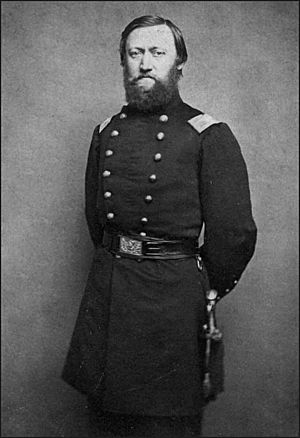Henry Warner Birge facts for kids
Quick facts for kids
Henry Warner Birge
|
|
|---|---|

Birge in colonel's uniform
|
|
| Born | August 25, 1825 Hartford, Connecticut |
| Died | June 1, 1888 (aged 62) New York City, New York |
| Place of burial |
Yantic Cemetery, Norwich, Connecticut
|
| Allegiance | United States of America Union |
| Service/ |
United States Army Union Army |
| Years of service | 1861–1865 |
| Rank | |
| Unit | 13th Connecticut Volunteer Infantry |
| Commands held | 2nd Division, XIX Corps District of Savannah |
| Battles/wars | American Civil War |
Henry Warner Birge (born August 25, 1825 – died June 1, 1888) was an important general who fought for the Union Army during the American Civil War. He was born in Hartford, Connecticut. Birge played a key role in many battles and campaigns throughout the war.
Contents
Henry Warner Birge's Military Career
Henry Warner Birge was born in Hartford, Connecticut. When the American Civil War began, he quickly joined the Union effort. He helped create the first state regiment of soldiers who would serve for three years. This unit was called the 4th Connecticut Infantry.
Early War Service
Birge started his military career as a major in the 4th Connecticut Infantry. He served with this regiment in both Maryland and Virginia. In February 1862, he was promoted to colonel. He then took command of the 13th Connecticut Infantry.
After this, Colonel Birge was given a very important job. He was put in charge of defending the city of New Orleans. This was a key city that the Union Army had captured.
Leading Troops in Battle
In December 1862, Birge was given command of a brigade. A brigade is a large group of soldiers, usually made up of several regiments. He led this brigade during the first Red River Campaign. This was a series of military operations in Louisiana.
Birge and his troops also took part in the siege of Port Hudson. A siege is when an army surrounds a fort or city to try and capture it. This siege was a long and difficult fight.
Promotions and Key Commands
In September 1863, Henry Birge was promoted to the rank of brigadier general. This was a major step up in his military career. He then served in the second Red River expedition. After that, he was put in command of the city of Baton Rouge.
In 1864, General Birge was given command of the Second Division of the XIX Corps. The XIX Corps was a large unit of the Union Army. He fought in battles during General Sheridan's important campaign in the Shenandoah Valley. This campaign was crucial for the Union.
End of the War and Later Life
In February and March 1865, General Birge was appointed to command the defenses of Savannah. His brigade also fought in the Carolinas Campaign. This was one of the last major campaigns of the war.
After Confederate General Joseph E. Johnston surrendered, Birge again commanded the district of Savannah. On February 25, 1865, President Abraham Lincoln nominated Birge for a special honor. He was awarded the rank of brevet major general. A "brevet" rank is an honorary promotion, often given for brave service. The U.S. Senate confirmed this award on March 3, 1865.
General Birge resigned from the army on October 18, 1865, after the war ended. In his later life, he worked as a banker and a businessman.
 | Jessica Watkins |
 | Robert Henry Lawrence Jr. |
 | Mae Jemison |
 | Sian Proctor |
 | Guion Bluford |

